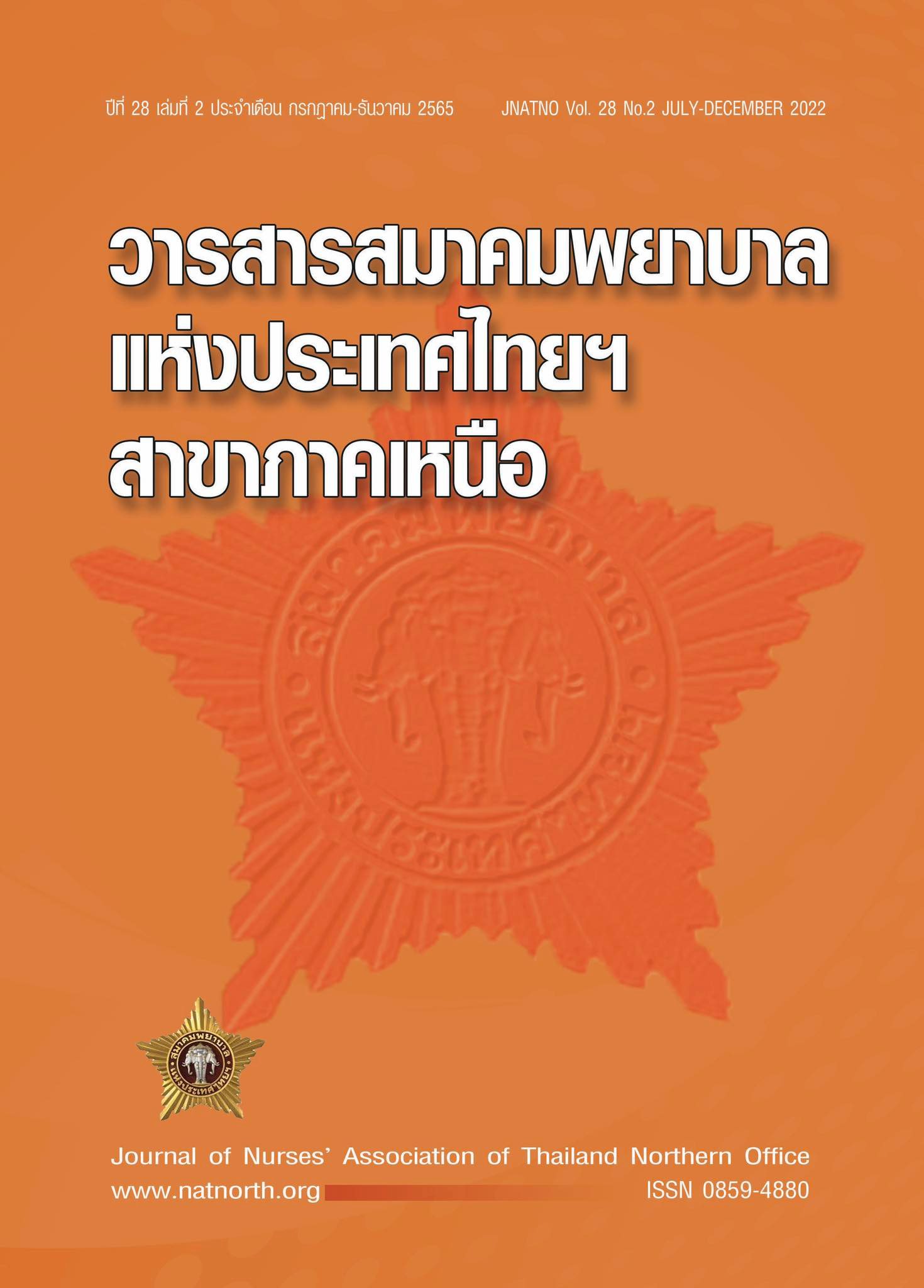ผลของโปรแกรมการป้องกัน COVID-19 ตามทฤษฎีการเรียนรู้ทางปัญญาสังคมต่อพฤติกรรมการป้องกันโควิด-19 ในเด็กวัยก่อนเรียน
คำสำคัญ:
COVID – 19 Prevention Program, COVID – 19 Prevention Behavior, Social Cognitive Theory, Preschool age childrenบทคัดย่อ
การวิจัยกึ่งทดลองแบบกลุ่มเดียววัดก่อนและหลังการทดลองครั้งนี้มีวัตถุประสงค์เพื่อศึกษาผลการใช้โปรแกรมการป้องกันโควิด-19 ตามทฤษฎีการเรียนรู้ทางปัญญาสังคม กลุ่มตัวอย่างคือเด็กวัยก่อนเรียน อายุระหว่าง 3-5 ปีที่กำลังศึกษาในศูนย์พัฒนาเด็กเล็กเทศบาลจังหวัดแพร่ จำนวน
14 คน ได้มาโดยสุ่มแบบกลุ่มชนิดสุ่มแบบแบ่งกลุ่มหลายขั้นตอน โดยใช้อำเภอ ตำบล และหมู่บ้าน เป็นหน่วยการสุ่ม เครื่องมือที่ใช้ในการวิจัยแบ่งเป็น 2ส่วน คือ1) โปรแกรมการส่งเสริมการป้องกันโควิด–19 ตามทฤษฎีการเรียนรู้ทางปัญญาสังคม 2) แบบประเมินพฤติกรรมการป้องกันโรคโควิด-19 ตรวจสอบความตรงตามเนื้อหาโดยผู้เชี่ยวชาญ 5 ท่าน มีค่าดัชนีความตรงตามเนื้อหา เท่ากับ 1 หาค่าความเชื่อมั่นของเครื่องมือระหว่างผู้ประเมิน โดยใช้ Rater Agreement Index (RAI) มีดัชนีความสอดคล้องระหว่างผู้ประเมินเท่ากับ 0.76 วิเคราะห์ข้อมูลด้วยสถิติdependent t-test
ผลการวิจัยพบว่า เด็กวัยก่อนเรียนมีพฤติกรรมการป้องกันโควิด–19 หลังได้รับโปรแกรมการป้องกันโควิด-19ตามทฤษฎีการเรียนรู้ทางปัญญาสังคมสูงกว่าก่อนได้รับโปรแกรมฯโดยพฤติกรรมการป้องกันโควิด–19 ด้านการหลีกเลี่ยงความเสี่ยงมีคะแนนค่าเฉลี่ยเพิ่มขึ้นจาก 8.71 (S.D.=4.78) เป็น 12.86 (S.D.=4.13) และด้านการดูแลตนเองและสังคมมีคะแนนค่าเฉลี่ยเพิ่มขึ้นจาก 6.36 (S.D.=2.63) เป็น 9.43 (S.D.=2.98) ซึ่งแตกต่างกันอย่างมีนัยสำคัญทางสถิติที่ p=.001ส่วนพฤติกรรม ด้านการลดการสัมผัสมีคะแนนค่าเฉลี่ยเพิ่มขึ้นจาก 14.43 (S.D.=2.9) เป็น 15.93 (S.D.=0.26) แต่ไม่มีนัยสำคัญทางสถิติ
จากผลการศึกษา ทีมสุขภาพหรือครูผู้สอนในสถานศึกษาสามารถนำโปรแกรมการป้องกันโรคโควิด19 ตามทฤษฎีการเรียนรู้ทางปัญญาสังคมไปใช้พัฒนา/ปรับพฤติกรรมเด็กวัยก่อนเรียน เพื่อให้เด็กก่อนวัยเรียนสามารถดูแลตนเองเบื้องต้น ป้องกันโรคโควิด-19เมื่อปฏิบัติกิจกรรมต่างๆในโรงเรียน
และชุมชน
เอกสารอ้างอิง
กระทรวงสาธารณสุข. ประกาศกระทรวงสาธารณสุข เรื่อง ชื่อและอาการสำคัญของโรคติดต่ออันตราย (ฉบับที่ 3) พ.ศ.2563 ราชกิจจานุเบกษา เล่ม 137 ตอนพิเศษ 48 ง [อินเตอร์เน็ต]. 2563 [เข้าถึงเมื่อ 2563/12/08]. เข้าถึงได้จาก: http://www.ratchakitcha.soc.go.th/DATA/PDF/2563/E/048 /T_0001.PD
กรมควบคุมโรค. COVID-19 (EOC-DDC Thailand) โรคติดเชื้อไวรัสโคโรนา 2019 [อินเตอร์เน็ต]. 2563 [เข้าถึงเมื่อ 2563/12/24]. เข้าถึงได้จาก: https://ddcportal.ddc.moph.go.th/portal/apps/
opsdashboard/Index.html#/20f3466e075e45e5946aa87c96e8ad65.
สราวุฒิ บุญสุข, บรรณาธิการ. คู่มือการปฏิบัติสำหรับสถานศึกษาในการป้องกันการแพร่ระบาดของโรคโควิด 19. นนทบุรี: คิว แอดเวอร์ไทซิ่ง จำกัด; 2563.
ชาคร เลิศนิทัศน์ และสมชัย จิตสุชน. ผลกระทบของโควิด-19 ต่อครัวเรือนที่มีเด็กเล็ก [อินเตอร์เน็ต]. 2563 [เข้าถึงเมื่อ 2563/12/25]. เข้าถึงได้จาก: https://tdri.or.th/2020/08/covid19-impact-early-child.
Unicef. รายงานรวบรวมผลกระทบทางเศรษฐกิจและสังคมของการระบาดโรคโควิด-19 ต่อเด็กและเยาวชนในประเทศไทย [อินเตอร์เน็ต]. 2564 [เข้าถึงเมื่อ 2564/10/12]. เข้าถึงได้จาก: https://www.unicef.org/thailand/media/8786/file/COVID19%20Impact%20on%20Children.pdf
Pisano L, Galimi D, Cerniglia L. A qualitative report on exploratory data on the possible emotional/behavioral correlates of Covid-19 lockdown in 4-10 years children in Italy. [ออนไลน์]. 2020 [เข้าถึงเมื่อ 2563/12/27]. เข้าถึงได้จาก: https://psyarxiv.com/stwbn/
อวาทิพย์ แว. COVID-19 กับการเรียนรู้สู่การปรับเปลี่ยนพฤติกรรมสุขภาพในวันนี้. วารสารสมาคมวิชาชีพสุขศึกษา. 2563;35(1):24-107.
ธานี กล่อมใจ จรรยา แก้วใจบุญ และทักษิกา ชัชวรัตน์. ความรู้และพฤติกรรมของประชาชนเรื่องการป้องกันตนเองจากการติดเชื้อไวรัสโคโรนา สายพันธุ์ใหม่ 2019. วารสารการพยาบาลการสาธารณสุขและการศึกษา. 2563;21(2):29-39.
ฐิติมา ชูใหม่. การเจริญเติบโตและพัฒนาการของเด็กปฐมวัย. วารสารหัวหินสุขใจไกลกังวล. 2559;1(2):18-33.
Bandura, A. Social foundations of thought and action: A social cognitive theory. New York: Prentice–Hall; 1986.
สุรางค์ โค้วตระกูล. จิตวิทยาการศึกษา. กรุงเทพฯ: สำนักพิมพ์แห่งจุฬาลงกรณ์มหาวิทยาลัย; 2559.
ณัฐติพร อ้นด้วง รุจา ภู่ไพบูลย์ และชื่นฤดี คงศักดิ์ตระกูล. ผลของโปรแกรมการสอนทักษะสุขภาพโดยใช้หนังสือการ์ตูนต่อพฤติกรรมสุขภาพของนักเรียนชั้นประถมศึกษาปี ที่ 5. Graduate Research Conference [อินเตอร์เน็ต]. 2556 [เข้าถึงเมื่อ 2564/01/31]. เข้าถึงได้จาก: https://gsbooks.gs.kku.ac.th/55/cdgrc13/files/mmo10.pdf.
ณภัทร ไวปุรินทะ จิตตาภรณ์ จิตรีเชื้อ และวราภรณ์ บุญเชียง. ผลการส่งเสริมการเรียนรู้เกี่ยวกับการป้องกันการติดเชื้อจากการสัมผัสต่อความรู้และการล้างมือของเด็กวัยก่อนเรียน [อินเตอร์เน็ต]. 2552 [เข้าถึงเมื่อ 2565/12/05]. เข้าถึงได้จาก: https://dric.nrct.go.th/Search/ShowFulltext/2/216834.
ศรีเรือน แก้วกังวาล. จิตวิทยาบุคลิกภาพร่วมสมัยและจิตบำบัด. กรุงเทพฯ: สำนักพิมพ์หมอชาวบ้าน; 2557.
รวีพร จรูญพันธ์เกษม และ มนต์ชัย เทียนทอง. กรอบแนวคิดการเรียนรู้ แบบปัญหาเป็นฐาน ออนไลน์แบบคู่ที่มีระบบจัดการความรู้ ตามประสบการณ์ที่จำแนกผู้เรียนตามความถนัดด้วยวิธี VARK [อินเตอร์เน็ต]. 2557 [เข้าถึงเมื่อ 2563/12/30]. เข้าถึงได้จาก: https://gsbooks.gs.kku.ac.th/57/grc15/files/sdp6.pdf.
จักรพันธ์ เพ็ชรภูมิ. พฤติกรรมสุขภาพ: แนวคิด ทฤษฎี และการประยุกต์ใช้. พิมพ์ครั้งที่ 3. พิษณุโลก: สำนักพิมพ์มหาวิทยาลัยนเรศวร; 2561.
พรทิพย์ ศิริบูรณ์พิพัฒนา. การพยาบาลเด็ก 1. พิมพ์ครั้งที่ 2. กรุงเทพฯ: บริษัท ธนาเพรส จำกัด; 2556.
จารุวรรณ สนองญาติ วิลาวัณย์ ธนวรรณ และยุคนธ์ เมืองช้าง. ผลของโปรแกรมการให้ข้อมูลผ่านหนังสือการ์ตูนสามมิติต่อความรู้ในการป้องกันการติดเชื้อของเด็กก่อนวัยเรียน. วารสารพยาบาลกระทรวงสาธารณสุข. 2558;26(2):34-42.
กัญญพัชร พงษ์ช้างอยู่. ผลของโปรแกรมส่งเสริมการเรียนรู้ด้วยการเล่านิทานต่อความฉลาดทางอารมณ์และพัฒนาการทางภาษาของเด็กปฐมวัย [อินเตอร์เน็ต]. 2560 [เข้าถึงเมื่อ 2564/01/7]. เข้าถึงได้จาก: http://digital_collect.lib.buu.ac.th/dcms/files/57910068.pdf.
ดาวน์โหลด
เผยแพร่แล้ว
รูปแบบการอ้างอิง
ฉบับ
ประเภทบทความ
สัญญาอนุญาต
ลิขสิทธิ์ (c) 2022 สมาคมพยาบาลแห่งประเทศไทยฯ สาขาภาคเหนือ

อนุญาตภายใต้เงื่อนไข Creative Commons Attribution-NonCommercial-NoDerivatives 4.0 International License.
บทความที่ได้รับการตีพิมพ์เป็นลิขสิทธิ์ของสมาคมพยาบาลแห่งประเทศไทยฯ สาขาภาคเหนือ
เนื้อหาและข้อคิดเห็นใดๆ ที่ตีพิมพ์ในวารสารสมาคมพยาบาลฯ ถือเป็นความรับผิดชอบของผู้เขียนเท่านั้น ผู้เขียนบทความต้องศึกษารายละเอียดหลักเกณฑ์การจัดทำต้นฉบับตามที่วารสารกำหนด และเนื้อหาส่วนภาษาอังกฤษต้องได้รับการตรวจสอบจากเจ้าของภาษามาแล้ว


